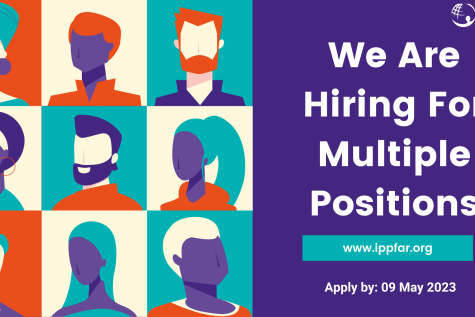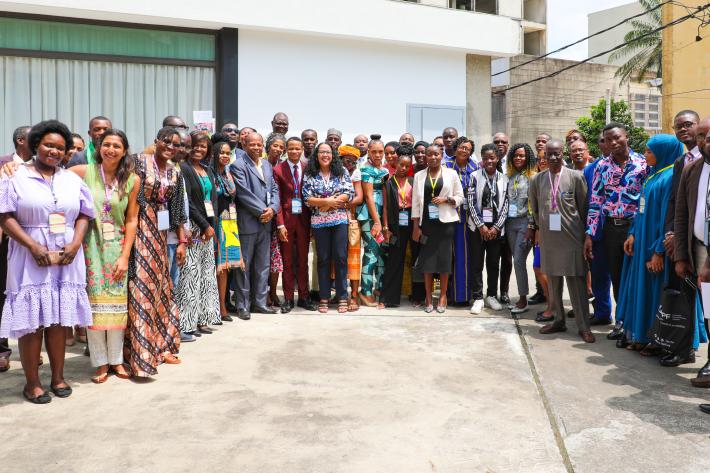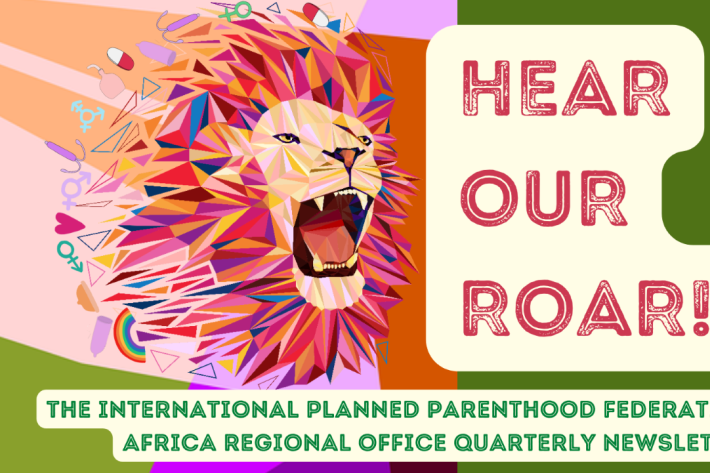
Spotlight
A selection of news from across the Federation

Africa
IPPF Africa Region is seeking talented individuals to support its work
In alignment with its strategy, the IPPF Africa Regional Office is hiring for multiple positions based in Kenya and Côte d'Ivoire.
Filter our news by:

| 08 February 2017
The "State of the African Woman Campaign" -Advocating for Women's Rights across the Continent
Monday 7 February 2017, Nairobi, Kenya The IPPF Africa Region Director, Mr. Lucien Kouakou has today launched a kick-off meeting for a new project focusing on women’s rights. The "State of the African Woman” campaign aims to contribute to securing, realizing and extending women’s rights as enshrined in African Union policies in sub-Saharan Africa. Funded by the European Union, the three-year advocacy, communication and awareness-raising campaign will be implemented by IPPF Africa Region as the lead beneficiary, with five organizations being co-beneficiaries, and two others as Associates. The campaign focuses on strengthening the civil society’s contribution to promote the implementation of the AU Protocol on the Rights of Women (Maputo Protocol) and the Maputo Plan of Action (MPoA) at four decision-making levels across sub-Saharan Africa; continental, regional, national and sub-national levels. The ability of Civil Society Organizations (CSOs) to push for the implementation of policies is of greatly acknowledged across the continent. “This unique coalition of youth-serving organizations, faith-based organizations, feminist groups and Sexual Reproductive Health and Rights (SRHR) activists will work towards the implementation of the State of the African Woman campaign across Africa. The combined strengths of these implementing partners will create a more united and collaborative civil society voice on women’s rights, reaching large and diverse constituencies and amplifying their ability to leverage change on a higher scale,” said Mr. Kouakou, while addressing participants at the kick-off meeting taking place from 7 – 8 February 2017 in Nairobi, Kenya. Participants are members of the project’s steering committee –all of whom are implementing partners. Even though there exists several continental and sub-regional agreements and policies in sub-Saharan Africa in which women’s rights are enshrined, slow progress with regard to implementation and realization of these rights have been noted. “The State of the African Woman Campaign seeks to convert policies on the protection of women’s rights into reality. The project firmly believes that norms and agenda-setting at policy level need to be accompanied by changes in social and religious norms. This campaign, which combines grassroots mobilization and political advocacy, enhances sustainability where changes in norms related to women’s rights at policy and societal levels lead to long-term systems changes, with direct impact on people’s lives. The campaign builds on partner’s experiences and ongoing advocacy programmes in the region,” he said. Mr. Kouakou expressed optimism about the project’s success, owing to the great implementation team involved. Also present in the kick-off meeting is Ms. Stephanie Truille-Baurens from the European Union, and the IPPF European Network Regional Director, Ms. Caroline Hickson, among others. Follow the State of the African Woman campaign via the hashtag #SoAW For more updates on our work, follow IPPF Africa Region on Facebook and Twitter

| 04 February 2017
Reproductive Health Uganda: Effectively Responding to the Cervical Cancer Burden
Cervical cancer is a major public health concern in developing countries. In Africa, an estimated 53,000 women die of the disease annualy, according to the World Health Organization (WHO). The IPPF Africa Region Member Association in Uganda -Reproductive Health Uganda implements the Cervical Cancer Screening and Preventative Therapy (CCSPT) Initiative, which uses static clinics and outreaches as the main service delivery modes. The CCPT initiative aims at maximizing the number of cancer services offered to women through a validated, low-cost screening and preventative therapy approach. Screening is carried out using Visual Inspection with Acetic Acid (VIA) -an evidence-based and affordable alternative approach for cervical cancer screening in low-resource settings. The CCSPT Initiative offers instant treatment for clients with pre-cancerous lesions using cryotherapy –a method that involves freezing of precancerous lesions. Ms. Annet Kyarimpa is the Special Projects Coordinator at RHU, and says that the CCSPT Initiative's outreach activities carried out by the organization account for the bulk of clients reached and served (over 75%). "The success of this approach is largely attributed to the fact that the outreaches are conducted in lower level health facilities (including government health facilities) that provide a conducive service delivery environment, where key considerations are factored," she says. These considerations include: - Privacy of the client - Appropriate consultation/examination rooms with adequate lighting - Spacious waiting areas - The opportunity to access other health services such as malaria treatment during the single visit. RHU's cervical cancer outreaches also provide an integrated SRH package including cervical cancer screening and cryotherapy treatment (possible with mobile carbon dioxide 10kg cylinders), STIs screening and management, HIV Counselling and Testing (HCT) as well as family planning services. In addition, RHU targets and works with established ART clinics in various public health facilities to reach out to women living with HIV through the provision of CCSPT services. “These are high-risk women, and RHU takes advantage of the already mobilized groups to offer them services within their existing facilities as they seek other services. For example, every Thursday RHU’s Fort Portal clinic visits and provides CCSPT services to ART patients at the Fort-portal Regional Referral Hospital. Working space was provided by the MCH department to support the partnership,” says Ms. Kyarimpa.. RHU’s Kampala branch recently had a successful collaboration with Infectious Disease Institute (IDI), where we were invited to provide family planning services and cervical cancer screening to HIV positive women attending IDI outreaches and health camps. RHU’s partnership with Rotary clubs has also helped reach-out to women and girls beyond the geographical coverage of the five RHU sites implementing the CCSPT Initiative. Rotary clubs conduct quarterly health camps within identified communities to address various health issues. They mobilize communities for services and procure medical supplies for use during the camp as well as cater for service providers’ accommodation in instances were providers have to sleep in the community. RHU provides transport for the service providers and SDA for the service providers. Story by Maryanne W. Waweru, IPPF Africa Region

| 04 February 2017
“Encourage a Woman you Care for to get Screened for Cervical Cancer Today” -Lucien Kouakou
February 4th is World Cancer Day, a day marked to enable all individuals, families, communities, groups and organizations to raise awareness about cancer risk factors, preventive measures that one can take, and the need to get screened for early detection, in order to avert the adverse effects of this deadly disease. It is worth noting that most cancer deaths can be prevented when detected early and/or the relevant vaccines are given at the appropriate time. Cervical cancer is among the avoidable cancer-related deaths, especially when the needed actions, including screening, are taken early. IPPF Africa Region has been positively contributing to the cancer response in Africa, through the Cervical Cancer Screening and Preventive Therapy (CCSPT) project, implemented in four countries; Kenya, Nigeria, Tanzania and Uganda. Also Read: "The Day I Faced my Greatest Fear Head-On" -Kellen Mbabazi From the inception of the project in 2012, a total of 498,330 individuals have benefited from screening and out of these, 10,362 have been treated with cryotherapy. It is worth noting that the potential death of over 10,000 women who may have progressed to the cancer stage, have been averted and their lives saved. Indeed, the project has made significant contribution towards reducing the cancer disease burden in the focus countries. In addition, IPPFARO in 2016 secured new funding for three Member Associations; Cote d’Ivoire, Ethiopia and Uganda to strengthen their work in the area of cervical cancer prevention. Through this funding support, and the hard work of volunteers and staff of the Member Associations, 32,132 women were screened, with 1,382 receiving cryotherapy treatment to arrest the pre-cancer cells. Also Read: "This is the Split-Second Decision I Made One Day that Saved my Life" -Teresia Wangui This year’s theme for the World Cancer Day remains “We can. I can.” I take this opportunity to encourage all; individuals, groups and organizations to contribute towards saving the lives of our African women from cancer deaths. This we can achieve by creating awareness on cancer prevention- education, coaching, motivating and encouraging people to check for and report signs and symptoms as early as possible. Emphasis should also be placed on preventive measures and reduction or avoidance of associated risk factors. “Encourage a woman you care about to get screened for cervical cancer today”. Mr. Lucien Kouakou is the IPPF Africa Region Director.
| 31 January 2017
IPPF Africa Regional Director Visits Family Guidance Association of Ethiopia (FGAE)
By Maryanne W. Waweru Monday 30 January 2017, Addis Ababa, Ethiopia The IPPF Africa Region Director Mr. Lucien Kouakou today paid a visit to the IPPF Member Association in Ethiopia –Family Guidance Association of Ethiopia (FGAE). During his visit, Mr. Kouakou met with FGAE members of staff including the Executive Director Ms. Genet Mengistu, whom he congratulated for their remarkable work in providing quality sexual reproductive health services to millions of Ethiopians. Mr. Kouakou, who is in the capital city of Addis Ababa attending activities around the 28th AU Summit, encouraged the members of staff to carry on with their commendable work. “We are proud of FGAE. Just last year, the organization celebrated 50 years of exemplary service and success in Ethiopia. FGAE is recognized as the pioneer organization for the introduction of family planning in the country, and five decades later, it is one of the leading providers of comprehensive, integrated, quality and gender-sensitive sexual reproductive health programs and services focusing on youth, underserved and vulnerable populations in Ethiopia. In addition, the success of FGAE’s Learning Center, which works closely with the Government and other partners in building the capacity of healthcare providers in Ethiopia through provision of needs-based quality sexual reproductive health training, is admirable. Indeed, the laudable success of FGAE is to be emulated not only in Ethiopia, but across Africa,” he said. Mr. Kouakou also assured FGAE of IPPF’s continued technical, financial and material support in regards to achievements of the organization’s goals. He further encouraged the Member Association to strive to establish and maintain formidable partnerships with other development stakeholders in the country, among them the Government, international, regional and national organizations, as well as local grassroots entities. “If we are to achieve our goals for sustainable development, then we must embrace the partnership of other organizations that share in our vision and the vision of ‘the Africa we Want’. When organizations work together, then they are able to accelerate development goals of the country and the continent, he said. The Regional Director further encouraged the Member Association to step up its efforts in resource mobilization, especially from domestic sources. “The African continent must steer its own development. We have to drive our own development agenda by investing our resources into innovative development-driven initiatives. Funding our own programmes will help avert some of the challenges that many development institutions face today –such as dwindling international donor funds or complete cut-back of funds. It is time for Africa to support Africa’s development through ventures such as domestic funding,” he said. In July last year, IPPF Africa Region launched the African Citizens Initiative (ACI) for sexual and reproductive health, which is a peer-to-peer fundraising campaign that aligns with the Africa Union’s Agenda 2063 commitment to the principle of self-reliance as well as the achievement of the Sustainable Development Goals. The FGAE Executive Director, Ms. Genet Mengistu reiterated FGAE’s commitment to serving millions of Ethiopian men, women, youth and children through its unmatched services. She further reiterated the Regional Director’s call for the establishment of strategic partnerships with other development players towards the achievement of the organization’s goals. “We will endeavor to seek more partnerships at all levels, as this will help boost the delivery of our wide range of services. While in Addis Ababa, among key meetings that the Regional Director has participated in is the Forum of African Parliamentarians on Population and Development (FPA) side event, in which he called for more investment in family planning, girls and young people in the realization of harnessing the demographic dividend. He also called on African Parliamentarians to deliver on their commitments to the Dakar Declaration, in their capacity as key influencers. “Parliamentarians have the ability to influence their colleagues to push for the support and implementation of policies and legislations, especially those related to youth, health, population and development. They can call for more budgetary allocation to related Ministries such as those of Youth, Gender and Social Affairs, Health, Education Planning and Development, as well as other institutions that focus on the youth and their reproductive health. They can also take the lead in seeking innovative ways of mobilizing resources at the local level that would champion population and related issues. Seeking African solutions to African problems through domestic funding is one way to realizing Africa’s development, and we count on our Parliamentarians to champion this cause,” he said. Read the full article here: African Parliamentarians are Key to the Realization of the Demographic Dividend Story by Maryanne W. Waweru. For more updates on our work, follow us on Facebook and Twitter

| 29 January 2017
The Global Gag Rule: IPPF's Projects at Risk
What is the Global GAG Rule? The Mexico City Policy, known as the Global Gag Rule (GGR), denies US funding to organiztions like IPPF if they use money from other donors to provide abortion services, counselling or referrals—even if abortion is legal in a country. The rule blocks critical funding for health services like contraception, maternal health, and HIV/AIDS prevention and treatment for any organization that refuses to sign up to it. When it has been enacted by previous Republican Presidents, evidence has shown that the rule has not reduced the number of abortions; rather, by eliminating access to contraception, it has led to more unintended pregnancies and more unsafe abortions. Related Article: IPPF Speaks out Against the Global Gag Rule How will the Global GAG Rule affect IPPF? IPPF's services apply an integrated approach. This means that any funding the federation loses could have a knock-on effect on array of services. For example, people who are getting voluntary family planning information, education and services may also need other types of healthcare like HIV testing and treatment, cervical cancer screening, infertility support or delivering maternal health services in humanitarian settings. Our integrated approach also covers work on sexual and gender based violence like rape, female genital mutilation and early and forced marriage. What will Happen? As a global SRH service delivery organization, IPPF has been partnering with USAID, the largest global voluntary FP donor for decades to increase access to reproductive health services. Currently, millions of men and women in the poorest and hardest to reach communities are accessing SRH services due to USAID support. With the GGR reinstated, many of these people will no longer have access to essential reproductive health services. Related Article: IPPF: Why we will not Sign the Global Gag Rule
| 28 January 2017
“We Count on our African Parliamentarians to Push the Youth Reproductive Health Agenda Forward” –Grace Banda
Grace Banda, a young lady from Zambia has called on African Parliamentarians to exercise their role in ensuring that the health concerns of Africa’s youth are prioritized. “African countries must honor their commitments to the Abuja Declaration, as this will make tremendous improvements in the health sector, and more so those touching on adolescent and young people’s sexual reproductive health. As Africa’s youth, we urge our Parliamentarians to hold their governments to account on this pledge. They have the voice and the power to push for the realization of this commitment, as well as ensuring that other laws and policies touching on youth and sexual reproductive health are implemented in a timely and effective manner. Our African Parliamentarians are key to the achievement of Africa’s development goals, including the harnessing of the demographic dividend which calls for investments in youth,” said Ms. Banda, a 23 year-old Youth Action Movement (YAM) member from Zambia and an advocate against Child Early and Forced Marriage (CEFM) among African girls. She made these remarks while addressing members of the Forum of African Parliamentarians on Population and Development (FPA) during a side event ahead of the 28th African Union summit in Addis Ababa, Ethiopia. In April 2001, the African Union countries met and pledged to set a target of allocating at least 15% of their annual budget to improve the health sector and urged donor countries to scale up support. However, years later, many of these countries are yet to meet their targets. Parliamentarians can ensure that these commitments are implemented. In her speech, Ms. Banda also called on Parliamentarians to assist in ensuring that adolescents and young people have access to age-appropriate sexuality information, and that they can be able to access reproductive health services in a youth-friendly manner. “Many adolescents and youth make poor decisions about their sexuality because they lack accurate information. They are also not able to access contraceptive services because health service providers are not sensitive and accommodative to their needs. There are also many prohibitive policies that prevent young people from accessing these services, and which, if reviewed, will avert poor health outcomes among them such as teenage pregnancies, school dropouts and Sexually Transmitted Infections (including HIV) among others. We call on our Parliamentarians to push for the removal of such policies and development of supportive ones that will enable young people to live healthy and productive lives, which will be a great plus for Africa’s development,” she said. Speaking at the same forum, IPPF Africa Region Director Mr. Lucien Kouakou, emphasized that indeed, Parliamentarians are instrumental in harnessing the demographic dividend, as they are greatly involved in the formulation of various policies and legislations that pertain to the country’s development. “Parliamentarians have the capacity to influence their colleagues to push for the support and implementation of policies and legislations, especially those related to youth, health, population and development. They can call for more budgetary allocation to related Ministries, such as those of Youth, Gender and Social Affairs, Health, Education Planning and Development, as well as other institutions that focus on the youth and their reproductive health. They can also take the lead in seeking innovative ways of mobilizing resources at the local level that would champion population and related issues. Seeking African solutions to African problems through domestic funding is one way to realizing Africa’s development, and we count on our Parliamentarians to champion this cause,” he said. Story by Maryanne W. Waweru, IPPF Africa Region. For more updates on our work, follow IPPF Africa Region on Facebook and Twitter
Pagination
- First page
- Previous page
- …
- 11
- 12
- 13
- …
- Next page
- Last page











